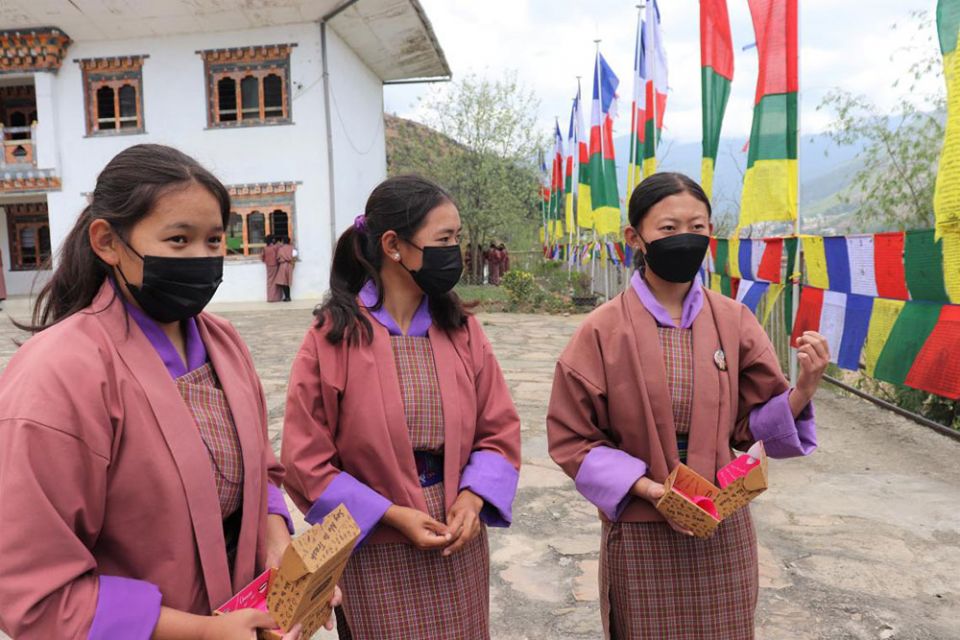
A girl’s first menstruation, the symbol of womanhood, is exciting. But, if they are not equipped with all the right information to manage their first menstrual cycle, it comes with a lot of mental, physical, and emotional pain.
Although menstruation is a normal process of a healthy body, in many societies, many mensurating girls and women continue to be constrained by cultural taboos and discriminatory social norms.
No one talks about period openly in Dechen’s small village. The only store that sells sanitary pads at an exorbitant rate runs out of the product quickly.
For Dechen, buying a sanitary pad involves a lot of courage—the teenager wanders around in front of the store and quickly enters the shop when no customer is around. Hesitant, she whispers “pads” to the shopkeeper. The store owner wraps a packet of sanitary pads in paper and hands it over to Dechen in a black plastic bag.
She still doesn’t know how to use pads. Her mother, a primary source of information, is busy on the farm. Dechen has seen her mother use “comfortable old rags” during mensuration, blood often dripping down her legs.
On any given day, more than 300 million women in the world are menstruating. An estimated 500 million lack access to menstrual products and adequate facilities for menstrual hygiene management.
Experts say that poor menstrual hygiene can lead to urinary or reproductive tract infections and other related illnesses.
In many countries of the European Region, lack of privacy and inadequate toilet doors or cubicles pose a challenge to girls during their period. According to a survey done by Plan International UK in 2017, 1 in 10 girls in the United Kingdom could not afford menstrual hygiene products, which affected their school attendance.
In Bhutan, a study by the education ministry and UNICEF on knowledge, attitude and practices of menstrual hygiene management of adolescent school girls and nuns in 2017 reported that 43 percent of the adolescent school girls missed school during menstruation.
About 42 percent of schoolgirls stated that they were aware of the fungal infection, and more than half of the respondents (57.1 percent) said that they were unaware of the reproductive tract infection related to poor menstrual hygiene.
It was also found that more than 40 percent of nuns didn’t know at all about infections related to poor menstrual hygiene management. More than half of the nuns were unaware of the Urinary Tract Infection.
In cases of special children, the study found that teachers suggested parents keep their child at home during menstruation as the school lacked the capabilities to help them.
There are 33 schools across Bhutan with 865 children with special educational needs of which 491 are adolescent girls.
A student at Khaling Muenseling Institute, Tshering Pem, said she changes her menstrual pads three times a day.
“I suffer from skin irritation and discomfort if I don’t change pads,” she said. “While we are here, the institute supplies us with sanitary pads, but getting pads in the village is a problem.”
Another student, Dawa Yangki said: “We received several trainings from matron and female teachers on the importance of using pads and menstrual hygiene.”
With the launching Red Dot Campaign in 2019 under the patronage HRH Princess Eeuphelma Choden Wangchuck, the menstrual movement is gaining popularity in the country.
Led by the education ministry in partnership with the Ministry of Health, the Dratshang Lhentshog, Bhutan Nuns Foundation, RENEW, SNV and UNICEF, the advocacy platform raises awareness on menstrual hygiene management and destigmatises menstruation.
The education ministry and partners distributed 2,000 menstrual cups, 17,000 reusable sanitary pads, 500 sanitary tampons and 5,500 disposable sanitary pads to 139 schools to safeguard the health and well-being of 2,700 adolescent girls.
More than 1,000 reusable dignity kit sets such as undergarments, reusable pads, and bags to store the garments were distributed to students in five schools.
After World Menstrual Hygiene Day last year, the rise of menstrual consciousness also caught social media platforms, with photos and videos of people sharing about breaking taboos associated with menstruation.
Last May, RENEW and the education ministry signed a memorandum of understanding (MoU) to promote adolescent sexual health and rights, and menstrual health management among girls and adolescents.
The first venture to distribute reusable sanitary napkins to schools and nunneries, under the MoU was signed too.
The education ministry and UNICEF are constructing inclusive toilets with WASH facilities in 24 schools with Special Education Needs programmes. Inclusive toilets are expected to benefit 139 children with disabilities.
Access to information and products is increasing for rural girls and women as well. Schools in the town areas are sharing menstrual products with schools in remote places.
For example, Zilukha MSS in Thimphu shared sanitary pads with students of Lauri Primary School in Samdrupjongkhar.
Similarly, the principal of Jigme Losel PS shared sanitary pads with schools of Jigme Sherubling CS, Khaling, Langdurbi PS, Zhemgang, Pangthang PS in Mongar, Dungmin PS, Mekuri PS.
Trashiyangtse MSS had shared sanitary pads with about nine schools. Lhaki group of companies, Thimphu City FC, and Bank of Bhutan have been supporting the movement with numerous schools and public figures in the country.
Laya Central School encouraged staff and students to break the silence on menstruation by donating and storing sanitary pads in the school.
Health officials visited villages to talk about menstruation hygiene. It included the use of pads, when to change, future complications related to menstrual hygiene, and knowledge about psychological feelings when they first menstruate
In Samtse’s Sang-Ngag Chhoeling Lower Secondary School, male teachers donated sanitary pads to support the initiative to break the silence on menstruation.
Currently, there are about eight pad-making machines in the country that were distributed by the education ministry.












